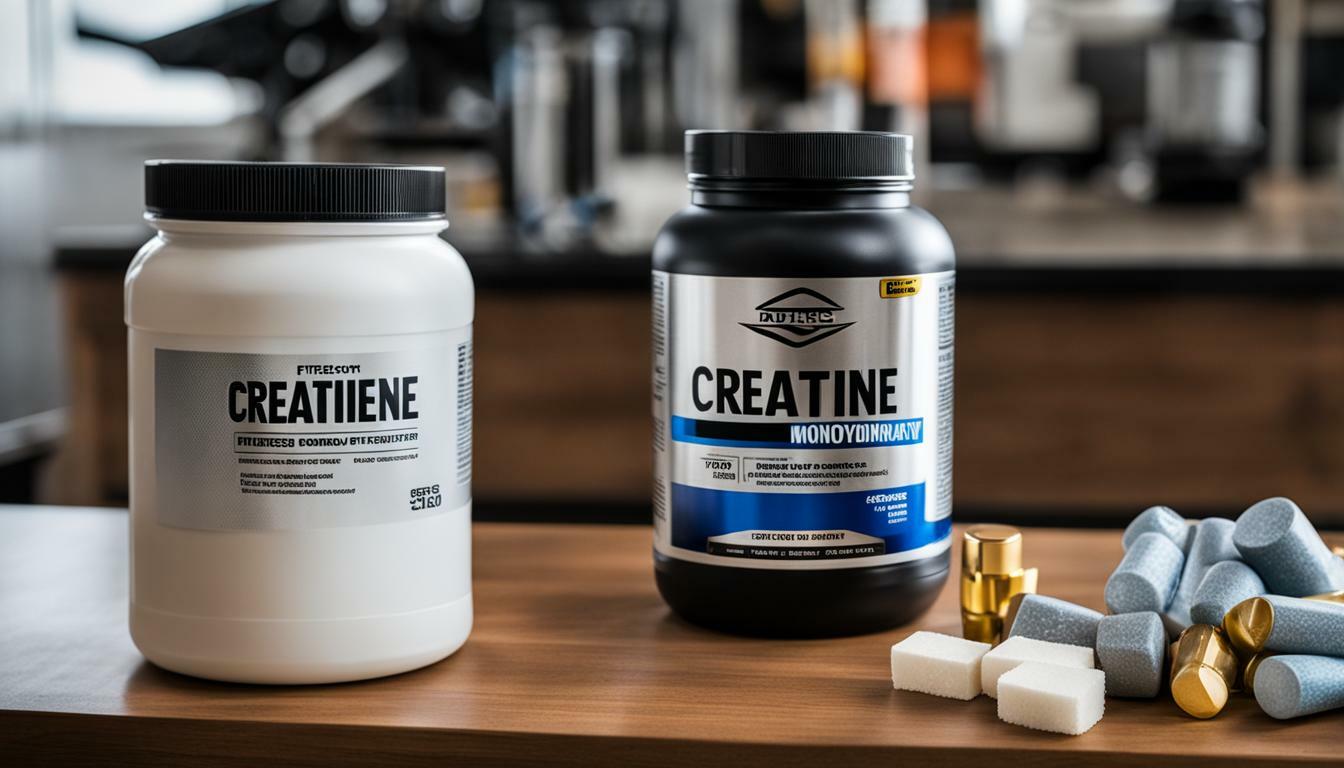When it comes to vitamin K2, there are different forms available, including MK-4 and MK-7. While they may sound similar, they have distinct differences in terms of bioavailability and potential benefits. Understanding these differences can help you make informed choices when it comes to supplementation.
Key Takeaways:
- Vitamin K2 MK-4 and MK-7 have different bioavailability and potential benefits.
- MK-4 is primarily found in animal products, while MK-7 is derived from fermented foods.
- MK-7 has better bioavailability, leading to higher serum levels.
- MK-4 may require higher doses to see significant effects due to its poor bioavailability.
- Both forms of vitamin K2 have been studied for their potential benefits in bone and cardiovascular health.
Bioavailability of Vitamin K2 MK-4 and MK-7
One important aspect to consider when comparing vitamin K2 MK-4 and MK-7 is their bioavailability. Bioavailability refers to how well a substance is absorbed and utilized by the body.
A study conducted on healthy Japanese women aimed to compare the bioavailability of MK-4 and MK-7. The results showed that MK-4, when administered as a single dose, was not detectable in the serum of the subjects. On the other hand, MK-7 was well absorbed and reached peak serum levels at around 6 hours after intake. Furthermore, consecutive administration of MK-4 did not increase serum MK-4 levels, while MK-7 supplementation significantly increased serum MK-7 levels in all subjects. These findings suggest that MK-7 has better bioavailability compared to MK-4.
In summary, the bioavailability of vitamin K2 MK-7 seems to be superior to that of MK-4. This means that MK-7 is more efficiently absorbed and utilized by the body, leading to higher serum levels. Understanding the differences in bioavailability is crucial in making informed decisions about vitamin K2 supplementation.
Sources of Vitamin K2 MK-4 and MK-7
Vitamin K2 MK-4 and MK-7 can be obtained from different food sources. MK-4 is primarily found in animal products such as eggs, meat, and liver. These sources contain small amounts of MK-4, and the conversion of menadione, a synthetic analog of vitamin K, contributes to its presence in these foods. However, it’s important to note that the concentration of MK-4 in animal products is relatively low compared to MK-7.
On the other hand, MK-7 is mainly derived from fermented foods. The Japanese fermented food known as natto is a particularly rich source of MK-7. Natto is made by fermenting soybeans and contains high concentrations of MK-7. Other fermented foods like cheese, curd, and sauerkraut also contain MK-7, although in smaller amounts compared to natto. These sources provide a diverse range of options for obtaining vitamin K2 MK-7.
Sources of Vitamin K2 MK-4 and MK-7
To summarize, while MK-4 is primarily found in animal products such as eggs, meat, and liver, MK-7 is derived from fermented foods like natto, as well as other fermented products like cheese, curd, and sauerkraut. These sources offer different concentrations of vitamin K2 MK-4 and MK-7, allowing individuals to choose the best dietary options based on their preferences and needs.
| Food Sources of Vitamin K2 MK-4 | Food Sources of Vitamin K2 MK-7 |
|---|---|
| Eggs | Natto |
| Meat | Cheese |
| Liver | Curd |
| – | Sauerkraut |

Benefits of Vitamin K2 MK-4
Vitamin K2 MK-4 has been studied for its potential benefits in bone and cardiovascular health. Although it has poor bioavailability, studies have shown that higher doses of MK-4 may be required to see significant effects. It is believed to have specific functions other than the γ-carboxylation of vitamin K-dependent proteins. However, more research is needed to fully understand the specific benefits of MK-4 and its optimal dosage.
Research suggests that vitamin K2 MK-4 may play a role in improving bone health by supporting the activation of osteocalcin, a protein involved in bone mineralization. A study conducted on postmenopausal women found that MK-4 supplementation significantly increased osteocalcin levels and improved bone mineral density. Additionally, MK-4 has also been shown to have potential cardiovascular benefits, such as reducing the risk of arterial calcification and improving arterial stiffness.
Potential benefits of Vitamin K2 MK-4:
- Supports bone health and bone mineralization
- May help reduce the risk of arterial calcification
- Improves arterial stiffness
- May have antioxidant properties
It is important to note that while there is promising research on the potential benefits of vitamin K2 MK-4, further studies are needed to validate these findings and determine the optimal dosage for specific health conditions. Consulting with a healthcare professional is recommended before starting any new supplement regimen.
| Potential Benefits of Vitamin K2 MK-4 | Research |
|---|---|
| Supports bone health and mineralization | Studies have shown increased osteocalcin levels and improved bone mineral density with MK-4 supplementation. |
| Reduces the risk of arterial calcification | Research suggests that MK-4 may help prevent the buildup of calcium in the arteries. |
| Improves arterial stiffness | MK-4 supplementation has been shown to enhance arterial flexibility and reduce stiffness. |
| May have antioxidant properties | Preliminary studies indicate that MK-4 may possess antioxidant effects. |
Benefits of Vitamin K2 MK-7
Vitamin K2 MK-7 offers numerous benefits for overall health, particularly in the areas of bone and cardiovascular health. Its superior bioavailability makes it an effective choice for supplementation. Here are some key benefits of Vitamin K2 MK-7:
- Promotes bone health: Vitamin K2 MK-7 plays a crucial role in activating osteocalcin, a protein responsible for binding calcium to the bone matrix. This process helps improve bone density and strength, reducing the risk of fractures and osteoporosis.
- Supports cardiovascular health: MK-7 has been shown to have a greater impact on normal blood coagulation compared to other forms of vitamin K. It aids in maintaining healthy blood clotting and may help reduce the risk of cardiovascular diseases, such as arterial calcification and heart disease.
- Enhances vitamin K status: MK-7 has a longer half-life in serum, resulting in a more sustained effect on carboxylation-grade of osteocalcin. This ensures that vitamin K levels remain optimized for longer periods, benefiting overall health.
- Potential anti-inflammatory effects: Some studies suggest that Vitamin K2 MK-7 may possess anti-inflammatory properties, which can be beneficial in reducing inflammation-related conditions and promoting overall well-being.
It is important to note that individual responses to Vitamin K2 MK-7 may vary, and it is best to consult with a healthcare professional for personalized dosage recommendations tailored to your specific health needs and goals. Supplementation with Vitamin K2 MK-7 can be a valuable addition to a well-rounded health regimen, supporting bone and cardiovascular health.

Side Effects of Vitamin K2 MK-4
Vitamin K2 MK-4 is generally considered safe when taken in recommended doses. However, there is limited information available on the specific side effects of MK-4. It is important to note that high doses of vitamin K in general may interfere with the effect of certain medications, such as anticoagulants, so it is crucial to consult with a healthcare professional before taking high doses of any form of vitamin K.
While the side effects of MK-4 are not well-documented, it is always advisable to follow the recommended dosages and guidelines provided by healthcare professionals. If you experience any unusual symptoms or have concerns about potential interactions with other medications or health conditions, it is important to seek medical advice.
Overall, vitamin K2 MK-4 is considered safe for most individuals when taken in appropriate doses. However, as with any supplement, it is best to consult with a healthcare professional before starting any new regimen to ensure safety and avoid potential interactions or adverse effects.
| Side Effects | Precautions |
|---|---|
| Interference with effect of anticoagulant medications | Consult with a healthcare professional before taking high doses |
| Unknown potential side effects | Follow recommended dosages |
Note: The table above provides a summary of potential side effects of vitamin K2 MK-4. It is important to consult with a healthcare professional for personalized advice and to determine the appropriate dosage for your specific needs.
Side Effects of Vitamin K2 MK-7
When it comes to the side effects of vitamin K2 MK-7, it is generally well-tolerated and does not have any significant reported adverse effects. Research studies have not identified any major concerns or safety issues associated with MK-7 supplementation.
However, it is important to note that every individual is unique, and some people may experience minor side effects or reactions to any supplement, including vitamin K2 MK-7. If you have any specific concerns or pre-existing medical conditions, it is always advisable to consult with a healthcare professional before starting any new supplement regimen.
Additionally, it is essential to follow the recommended dosage guidelines for vitamin K2 MK-7 to ensure safety and effectiveness. Taking extremely high doses of any supplement can potentially lead to unwanted effects. Therefore, it is crucial to stick to the recommended dosage and seek professional guidance when necessary.
In summary, vitamin K2 MK-7 is generally considered safe with no significant reported side effects. However, it is always best to consult with a healthcare professional before starting any new supplement and to follow the recommended dosage to ensure optimal health benefits.
Dosage of Vitamin K2 MK-4
When it comes to the dosage of vitamin K2 MK-4, there is no established optimal dosage due to limited research. Previous studies have used a wide range of doses, from 600 µg to 45,000 µg daily. However, it is important to note that MK-4 has poor bioavailability, meaning that it is not easily absorbed by the body. As a result, higher doses may be required to see significant effects.
It is recommended to consult with a healthcare professional to determine the appropriate dosage of vitamin K2 MK-4 based on individual needs and health conditions. They can provide personalized recommendations that take into account factors such as age, gender, and existing medical conditions.
Additionally, it is important to follow the recommended dosage to avoid any potential side effects or interactions with medications. While there is limited information available on the side effects of vitamin K2 MK-4, high doses of vitamin K in general may interfere with the effect of certain medications, such as anticoagulants. Therefore, it is crucial to discuss any concerns or questions with a healthcare professional before starting any new supplement regimen.
| Dosage | Recommended Intake | Source |
|---|---|---|
| 600 µg – 45,000 µg daily | No established optimal dosage | Previous studies |
Dosage of Vitamin K2 MK-7
When it comes to the dosage of Vitamin K2 MK-7, it is important to note that the recommended amount can vary depending on the specific health goal. Most studies have used doses ranging from 45 µg to 100 µg daily. Starting with lower doses and gradually increasing if necessary is generally recommended. It is always best to consult with a healthcare professional before starting any new supplement regimen for personalized dosage recommendations.
Factors to Consider for Dosage
There are several factors to consider when determining the appropriate dosage of Vitamin K2 MK-7 for an individual. These factors may include age, overall health, specific health conditions, and any other medications or supplements being taken. Consulting with a healthcare professional can help ensure that the dosage is tailored to individual needs and will be safe and effective.
It is important to note that while Vitamin K2 MK-7 is generally well-tolerated and does not have any significant side effects reported, it is still advisable to follow recommended dosages. As with any supplement, taking excessively high doses could lead to potential adverse effects. Therefore, it is always recommended to stay within the recommended dosage range and to consult with a healthcare professional if there are any specific concerns or pre-existing medical conditions.
| Recommended Dosage Range | 45 µg to 100 µg daily |
|---|---|
| Main Factors to Consider |
|
In summary, the recommended dosage of Vitamin K2 MK-7 ranges from 45 µg to 100 µg daily. Consulting with a healthcare professional for personalized dosage recommendations is crucial to ensure the dosage is appropriate and safe for individual needs. Following the recommended dosage range is important, as excessively high doses could potentially lead to adverse effects. By considering factors such as age, overall health, specific health conditions, and other medications or supplements being taken, healthcare professionals can provide guidance for optimal dosage.
Conclusion
In conclusion, the comparison between vitamin K2 MK-4 and MK-7 reveals distinct differences in bioavailability and potential benefits. MK-4, found in animal products, has poor bioavailability and does not contribute significantly to vitamin K status. On the other hand, MK-7, derived from fermented foods, exhibits better absorption and can significantly increase serum levels.
Both forms of vitamin K2 have been studied for their potential benefits in bone and cardiovascular health. MK-4 requires higher doses to see significant effects, while MK-7 has a greater and longer-lasting impact on normal blood coagulation and overall carboxylation-grade of osteocalcin. However, more research is needed to fully understand the specific benefits and optimal dosages of each form.
When considering supplementation, it is crucial to consult with a healthcare professional for personalized dosage recommendations. This ensures the safety and effectiveness of vitamin K2 supplementation and helps individuals make informed choices based on their unique needs and health conditions.
FAQ
What is the difference between vitamin K2 MK-4 and vitamin K2 MK-7?
Vitamin K2 MK-4 and MK-7 are two different forms of vitamin K2 with distinct bioavailability and potential benefits.
How does the bioavailability of vitamin K2 MK-4 and MK-7 differ?
MK-7 has better bioavailability and has been shown to significantly increase serum levels, while MK-4 has poor bioavailability and does not contribute much to the vitamin K status.
What are the sources of vitamin K2 MK-4 and MK-7?
MK-4 is primarily found in animal products, while MK-7 is derived from fermented foods like cheese, curd, sauerkraut, and natto.
What are the benefits of vitamin K2 MK-4?
Vitamin K2 MK-4 has been studied for its potential benefits in bone and cardiovascular health.
What are the benefits of vitamin K2 MK-7?
Vitamin K2 MK-7 has been shown to have greater bioavailability and potential benefits in bone and cardiovascular health.
What are the side effects of vitamin K2 MK-4?
Limited information is available on the side effects of vitamin K2 MK-4. However, high doses of vitamin K in general may interfere with the effect of certain medications, such as anticoagulants.
What are the side effects of vitamin K2 MK-7?
MK-7 is generally well-tolerated and does not have any significant reported side effects.
What is the optimal dosage of vitamin K2 MK-4?
The optimal dosage of vitamin K2 MK-4 is not well-established, and higher doses may be required to see significant effects due to its poor bioavailability. It is recommended to consult with a healthcare professional for personalized dosage recommendations.
What is the optimal dosage of vitamin K2 MK-7?
The recommended dosage of vitamin K2 MK-7 varies depending on the specific health goal. Most studies have used doses ranging from 45 µg to 100 µg daily.
What is the conclusion about vitamin K2 MK-4 and MK-7?
Vitamin K2 MK-4 and MK-7 are two different forms of vitamin K2 with distinct bioavailability and potential benefits. MK-7 has better bioavailability and has been shown to significantly increase serum levels. Further research is needed to fully understand the benefits and optimal dosages of MK-4 and MK-7.
 Skip to main content
Skip to main content


